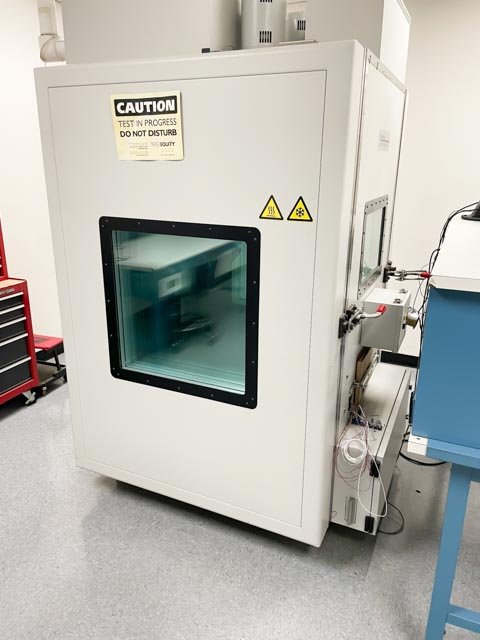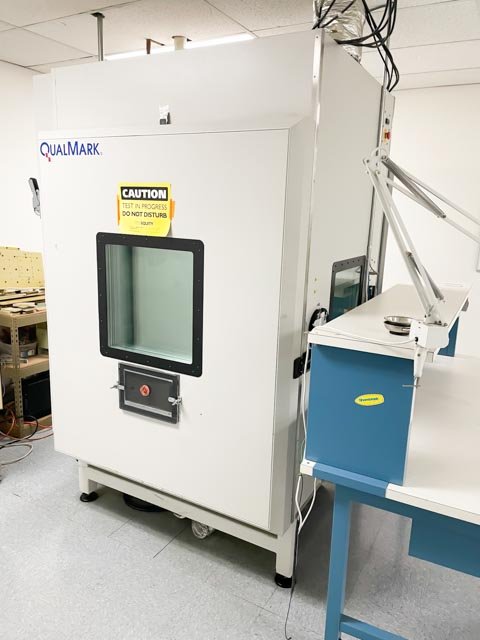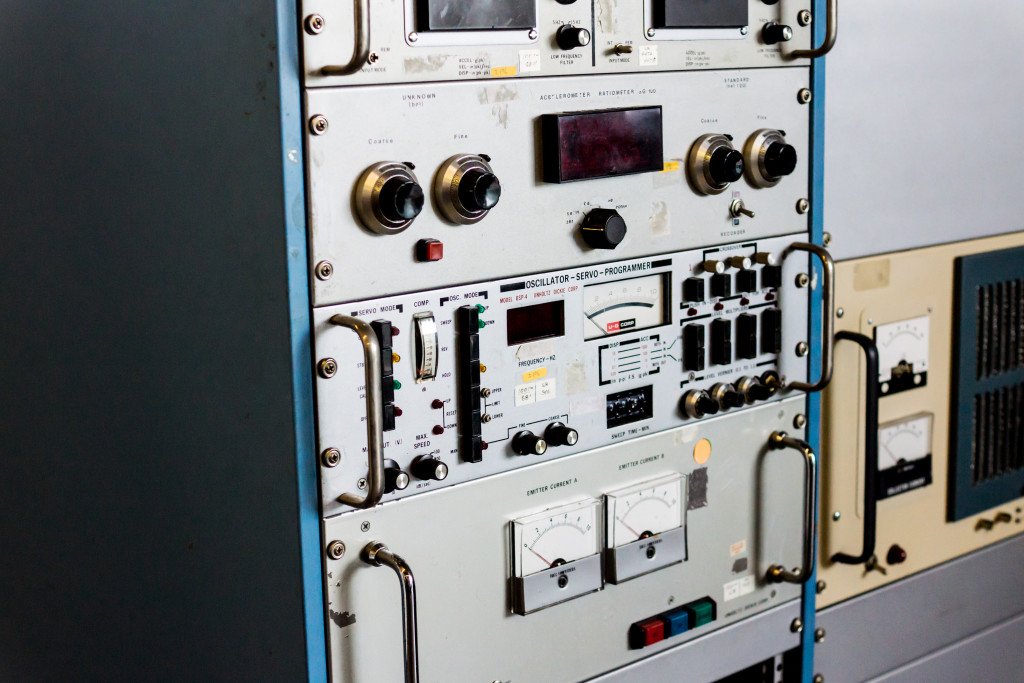CI Testing Lab Locations

CI Silicon Valley Testing Lab

CI Los Angeles Testing Lab - click to view lab equipment

CI North Carolina Testing Lab - click to view lab equipment
HALT & HASS Testing Lab
15661 Producer Lane, STE H
Huntington Beach, CA 92649
(408) 986-8880 ext.180
info@go-ci.com
HALT Testing and HASS Testing
CI Testing Labs provides experienced HALT and HASS testing services. HALT (highly accelerated life test) and HASS (highly accelerated stress screen) testing allows reliability engineers to understand where product defects and failures are likely to occur throughout the design, development, and manufacturing stages.
What is HALT testing?
HALT — Highly Accelerated Life Testing — is high-stress testing used to discover weaknesses in the early stages of a product’s lifecycle. Consequently, HALT testing is typically employed while a product is still in its design phase or development stage.
Unlike traditional tests that require days or even months to produce partial results, HALT testing uses incrementally increasing levels of stress over short intervals to ultimately exceed expected parameters of use and hasten failure in hours. Since HALT testing is specifically designed to uncover faults and anomalies, it should not be thought of as a test that produces pass/fail results. Instead, it reveals the weakest areas of a product in its design phase. Periodically repeating HALT testing during development reveals failures and weaknesses, allowing product designers to make necessary improvements prior to commencing production.
Crystal Instruments employs a specialized HALT chamber during HALT testing to put the unit under test through growing levels of stress associated with temperature and vibration. The standard HALT testing procedure includes the following five steps:
Hot thermal step stress
Cold thermal step stress
Rapid thermal cycling
Vibration step stress
Combined environment
HALT testing significantly reduces the time required to discover all likely failures in comparison to traditional tests such as Design Verification Testing and Environmental Stress Screening.
What is HASS testing?
HASS — Highly Accelerated Stress Screening — is a testing method specifically designed to uncover product defects and weaknesses that can result from production and manufacturing processes. HASS testing services are typically conducted on products that have already been HALT tested and have entered the production phase. While both forms of Accelerated Stress Testing (AST) aim to uncover weaknesses in products, the difference between HALT and HASS testing is important to note.
Products with HASS reliability have been tested for hidden flaws that traditional tests might not detect. HASS testing employs incremental stresses that exceed the product’s specifications but remain within the design parameters of the earlier HALT test results.
The combined use of thermal and vibration stresses in HASS testing finds product defects that would otherwise appear as out-of-box failures to customers — most likely costing the manufacturer in warranty fees and eroded customer confidence. Timely HASS test results allow reliability engineers and manufacturers to make the necessary corrections and modifications to a product before production.
HALT and HASS Testing Equipment
Halt testing chambers and HASS testing chambers with real-time reporting.
| -100 °C to +200 °C; > 50 °C/min transition rate |
| Up to 60 gRMS, 6 DOF repetitive shock |
| Programmable SSR's for automation of UUT |
| Six response accelerometers and 18 auxiliary thermocouples |
| In-house test fixture fabrication services: Complete design and fabrication of small fixtures up to fully automated test sleds, including software. HALT and HASS experts in fixture design and fabrication. |
FAQs (Frequently Asked Questions)
-
HALT/HASS is most effective as a tool that brings to light design or manufacturing flaws allowing you the opportunity to correct them before they become costly. If you use an outside manufacturer to build your products, HALT/HASS testing can illuminate problems that might exist as a result of manufacturing, allowing you the opportunity to make changes that help improve overall product reliability.
-
Many new customers can feel overwhelmed when starting their first HALT test. CI provides a list of considerations to help.
How will the hardware be functionally tested while in the chamber?How will the cause of anomalies be traced to the source?
What is the duration of the functional test? Is it continuous or run periodically?
What will be monitored? Here are a few examples:
Voltage
Current
Frequency
Input/output signals
Communications
Mechanical actuation, position
Motors, solenoids, valves
Audio
VideoDo you need to depress buttons, switches, levers, touch screen, etc?
Can some items me isolated and or removed from the chamber that should not be exposed to high temperatures or vibration? Such as Li batteries, hard drives or sensitive devices.
Multiple spare units and or parts should be available to enable onsite repairs.
If the unit to be tested is fully enclosed in plastic or sheet metal, can covers be removed or large holes added to the covers to improve temperature exposure to the internal parts?
What will constitute a failure condition?
Fixture requirements (Typically performed by CI Testing Lab Services).
Extended cables to connect to external test equipment of approximately 6-8 feet.
Thermocouple and Accelerometer monitoring locations (CI Testing Lab Services can help determine locations).
Are there known limitations to the hardware such as built-in thermal protection or unusual sensitivity to temperature that would cause a premature failure? Can built-in protections be over-ridden? -
HALT/HASS testing is different than qualification testing in a few different ways. During HALT/HASS tests, the products are operational during testing where in qualification testing they are typically not powered and non-operational. Qualification testing also only tests the product to function within the guidelines of a certain specification. With HALT testing, the purpose of the test is to bring your product to its operational and destruction limits in order to figure out the where, why, and how a product fails. With this data, you can make tweaks to your design that helps build a more rugged and robust product.
With HASS testing, the purpose of the testing is to make sure that the product remains operational and performs as advertised within the operational limits as defined in the HALT testing and acts as a screen that can detect problems in a large population of products that might be out in the field. HASS testing is a great way to randomly sample a handful of products in a lot to make sure that they are performing the way they were intended. -
HALT testing does not replace qualification testing or obviate the need for it. If you plan on selling your product to a government or the military then you are probably well aware of which specifications your product needs to adhere to. HALT is a tool that lets engineers put the product through its paces and determine where and what kinds of failures will occur both on a component and system wide level. HALT is of most benefit in the design phase of a new product, or the development phase of a new product upgrade and can help engineers make changes to designs that translate into a more durable and robust final product. CI Testing Lab Services also provides some qualification testing services and can help in both the design phase and qualification phase of your project.
-
Our HALT chambers are specifically designed to perform a random vibration profile, often called “6 degrees of freedom”. We do have the capabilities to perform vibration using a particular specification or waveform, but those kinds of tests fall outside the parameters of a traditional HALT test and are tested as vibration only.
-
Humidity testing is not part of standard HALT testing. Customer needs for humidity testing typically varies given the product they design. Humidity is also not as stressful on the internal components of your product as thermal expansion and contraction or vibration, and can also take weeks to perform instead of the 1-3 days for a traditional HALT test. We can however perform humidity tests according to your needs or specifications if that is a requirement. If you require more information on humidity testing, feel free to contact us. We’re happy to help!
-
Most HALT customers typically schedule their testing early on in the development phase of a new product. Since HALT testing can begin identifying weaknesses before your product is even sold, it can help aid and in some cases expedite product design. If you are at the point in your design that you are able to prototype multiple units for testing, than it might be a good point to start HALT testing to begin identifying and eliminating problems before they make it into the final design. Many customers will put new products through HALT testing multiple times before final production begins.
-
CI Testing Lab Services has one of the most experienced HALT/HASS labs in the country, performing HALT/HASS screening for over a decade. We were one of the very first labs to specialize in HALT/HASS testing and have worked closely with engineers from many of America’s biggest manufacturers. Our testing lab works with many aerospace, defense, medical and commercial device manufacturers.
-
One of the value added services CI Testing Lab Services provides is making a customized fixture for your product. Since each product has different sizes, dimensions, and needs for collecting data, we work with your engineers to help design and fabricate a fixture that can accommodate your desires. All we require is mechanical drawings of your product or a sample in order to begin creating a fixture. It typically takes up to a week for us to fabricate a fixture for your test, depending on the complexity of the product, the sample size you want tested and your particular data capture requirements.










